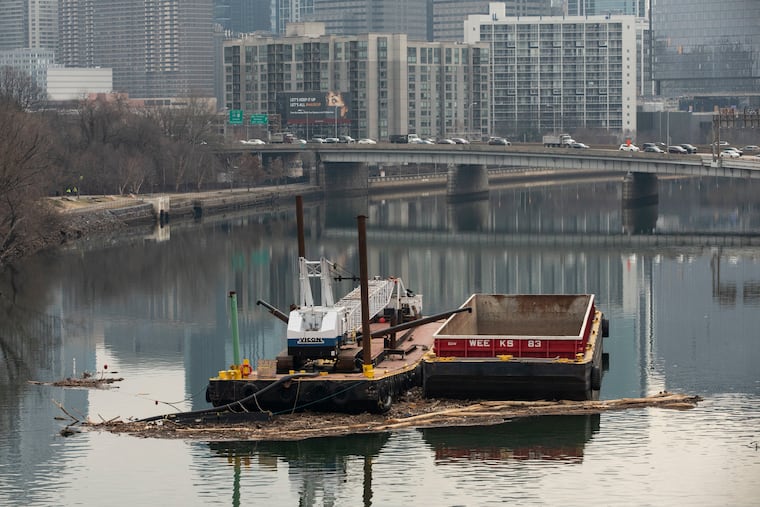Schuylkill dredge project halted as contractor says there’s too much debris in river, infuriating rowers
The effort to dredge the Schuylkill in front of Boathouse Row to clear a better path for races and recreational use has ground to a halt, leaving the job largely unfinished.

A contractor dredging the Schuylkill along Philadelphia’s iconic Boathouse Row has stopped work, claiming it needs more money to continue working after it found too much large debris such as telephone poles at the bottom.
The delay has raised the ire of the Schuylkill Navy and local rowing community, which says racing lanes and other areas need clearing or the city could lose its famed regattas.
Work on the long-awaited dredge project began June 1 but has been halted since November, putting the contractor, Atlantic Subsea Inc., of Bridgeport, N.J., in a stalemate with the U.S. Army Corps of Engineers, which is managing the project.
“In a year that was already littered with many disappointments, the word disappointment doesn’t begin to describe the degree of frustration and challenge that the failure to perform by this contractor has created for this community,” said Bonnie Mueller, commodore-elect of the Schuylkill Navy, an association of amateur rowing clubs in Philadelphia.
Atlantic Subsea anticipated finding debris, such as tires, concrete blocks, and trash, said its lawyer Richard Coe. But removal of other big items the company kept encountering — such as full-sized trees, railroad ties, and pilings — were not part of the deal, he said, and require more equipment and money.
“These kinds of unusually large items create a safety hazard in operating the dredging equipment,” Coe said.
The Army Corps disputes the notion that the debris wasn’t in the scope of work, as do the rowers.
Problems arose almost immediately when Atlantic Subsea began in June. The company realized it needed to bring in equipment such as excavators that Coe said were not covered in the arrangement with the Army Corps.
Coe said the company is committed to the project but needs money to pay for the additional equipment. He did not specify how much “due to the uncertainties as to the quantity of the debris to be removed.”
The Army Corps has indicated there is no more money for the project. It took years for the Schuylkill Navy to raise $4.5 million for the dredge. The City of Philadelphia, the state, local universities with rowing clubs, the William Penn Foundation, the rowing and paddling communities, and members of the public all pitched in.
The Army Corps issued a statement saying it “remains in a contractual impasse” with Atlantic Subsea.
“We are currently working through contractual/legal processes for these types of situations,” the statement said. “We will continue to work closely with the City of Philadelphia and we remain committed to resolving issues and moving forward on this important project.”
Mueller said the potential for such debris was clearly laid out in the project’s request for proposal.
Less than 5% of the dredging has been completed, she said.
“As rowers ... we uniquely understand the concept of everyone doing their job and pulling their own weight,” Mueller said. “With regard to this project, there are multitudes of people that have done exactly that, but in our opinion, the contractor Atlantic Subsea is not one of them.”
» READ MORE: Schuylkill dredging starts June 1 to clear sediment for rowers once fearful of regatta cancellations
The project calls for dredging three miles of the non-tidal Schuylkill above Fairmount Dam to remove 60,000 cubic yards of sediment that’s created a dangerous situation for rowers and possibly threatens future regattas if not cleared.
The project ran into bumps last year because of COVID-19 restrictions. Then, in August, a deluge on the river from Hurricane Isaias caused a 100-ton barge being used in the project to strike the Vine Street Bridge. In addition, work had to be carried out around fish migration schedules.
Further frustrating rowers: All the docks in front of Boathouse Row had been removed and stored upstream in anticipation of dredging being complete by spring.
But that storage area was supposed to be temporary, so some of the docks had to be put back, and might have to be removed again if or when dredging continues. Some clubs bought new docks at great expense but can’t install them until the job is finished.
There is no time frame now as to when the dredging might be complete.
No regattas are scheduled because of the city’s COVID-19 restrictions on large events until at least March 1. Mueller said the regattas, including the Dad Vail and Stotesbury Cup, will go on if allowed.
“The organizers of those events have met and we don’t imagine a situation whereby not having the dredging completed would preclude us from having regattas in 2021,” she said.